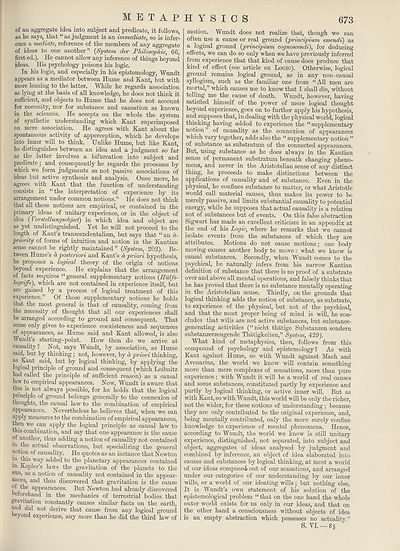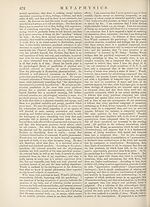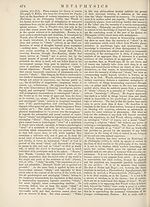New volumes of the Encyclopædia Britannica > Volume 30, K-MOR
(717) Page 673
Download files
Complete book:
Individual page:
Thumbnail gallery: Grid view | List view

673
M E T A P
of au aggregate idea into subject and predicate, it follows,
as he says, that “ as judgment is an immediate, so is infer¬
ence a mediate, reference of the members of any aggregate
of ideas to one another” {System der Philosophie, 66,
first ed.). He cannot allow any inference of things beyond
ideas. His psychology poisons his logic.
In his logic, and especially in his epistemology, Wundt
appears as a mediator between Hume and Kant, but with
more leaning to the latter. While he regards association
as lying at the basis of all knowledge, he does not think it
sufficient, and objects to Hume that he does not account
for necessity, nor for substance and causation as known
in the sciences. He accepts on the whole the system
of synthetic understanding which Kant superimposed
on mere association. He agrees with Kant about the
spontaneous activity of apperception, which he develops
into inner will to think. Unlike Hume, but like Kant,
he distinguishes between an idea and a judgment so far
as the latter involves a bifurcation into subject and
predicate; and consequently he regards the processes by
which we form judgments as not passive associations of
ideas but active synthesis and analysis. Once more, he
agrees with Kant that the function of understanding
consists in ££ the interpretation of experience by its
arrangement under common notions.” He does not think
that all these notions are empirical, or contained in the
primary^ ideas of unitary experience, or in the object of
idea {Yorstellungsobject) in which idea and object are
as yet undistinguished. Yet he will not proceed to the
length of Kant’s transcendentalism, but says that ££ an a-
priority of forms of intuition and notion in the Kantian
sense cannot be rightly maintained ” {System, 202). Be¬
tween Hume’s a posteriori and Kant’s d priori hypothesis,
he proposes a logical theory of the origin of notions
beyond experience. He explains that the arrangement
of facts requires ££ general supplementary notions {Hiilfs-
begriffe), which are not contained in experience itself, but
are gained by a process of logical treatment of this
experience.” Of these supplementary notions he holds
that the most general is that of causality, coming from
the necessity of thought that all our experiences shall
be arranged according to ground and consequent. That
sense only gives to experience coexistences and- sequences
of appearances, as Hume said and Kant allowed, is also
Wundt’s starting-point. How then do we arrive at
causality 1 Hot, says Wundt, by association, as Hume
said, but by thinking • not, however, by a priori thinking,
as Kant said, but by logical thinking, by applying the
logical principle of ground and consequent (which Leibnitz
had called the principle of sufficient reason) as a causal
law to empirical appearances. Now, Wundt is aware that
this is not always possible, for he holds that the logical
principle of ground belongs generally to the connexion of
thoughts, the causal law to the combination of empirical
appearances. Nevertheless he believes that, when we can
aPPly measures to the combination of empirical appearances,
then we can apply the logical principle as causal law to
this combination, and say that one appearance is the cause
of another, thus adding a notion of causality not contained
m the actual observations, but specializing the general
notion of causality. He quotes as an instance that Newton
in this way added to the planetary appearances contained
in Kepler’s laws the gravitation of the planets to the
sun, as a notion of causality not contained in the appear¬
ances, and thus discovered that gravitation is the cause
of the appearances. But Newton had already discovered
beforehand in the mechanics of terrestrial bodies that
gravitation constantly causes similar facts on the earth,
and did not derive that cause from any logical, ground
beyond experience, any more than he did the third law of
H Y s i c S
motion. Wundt does not realize that, though we can
often use a cause or real ground {principium essendi) as
a logical ground {principium cognoscendi), for deducing
effects, we can do so only when we have previously inferred
from experience that that kind of cause does produce that
kind of effect (see article on Logic). Otherwise, logical
ground remains logical ground, as in any non-causal
syllogism, such as the familiar one from “All men are
mortal,” which causes me to know that I shall die, without
telling me the cause of death. Wundt, however, having
satisfied himself of the power of mere logical thought
beyond experience, goes on to further apply his hypothesis,
and supposes that, in dealing with the physical world, logical
thinking having added to experience the “ supplementary
notion ” of causality as the connexion of appearances
which vary together, adds also the “ supplementary notion ”
of substance as substratum of the connected appearances.
But, using substance as he does always in the Kantian
sense of permanent substratum beneath changing pheno¬
mena, and never in the Aristotelian sense of any distinct
thing, he proceeds to make distinctions between the
applications of causality and of substance. Even in the
physical, he confines substance to matter, or what Aristotle
would call material causes, thus makes its power to be
merely passive, and limits substantial causality to potential
energy, while he supposes that actual causality is a relation
not of substances but of events. On this false abstraction
Sigwart has made an excellent criticism in an appendix at
the end of his Logic, where he remarks that we cannot
isolate events from the substances of which they are
attributes. Motions do not cause motions; one body
moving causes another body to move: what we know is
causal substances. Secondly, when Wundt comes to the
psychical, he naturally infers from his narrow Kantian
definition of substance that there is no proof of a substrate
over and above all mental operations, and falsely thinks that
he has proved that there is no substance mentally operating
in the Aristotelian sense. Thirdly, on the grounds that
logical thinking adds the notion of substance, as substrate,
to experience of the physical, but not of the psychical,
and that the most proper being of mind is will, he con¬
cludes that wills are not active substances, but substance¬
generating activities (“nicht thatige Substanzen sondern
substanzerzeugende Thatigkeiten,” System, 429).
What kind of metaphysics, then, follows from this
compound of psychology and epistemology? As with
Kant against Hume, so with Wundt against Mach and
Avenarius, the world we know will contain something
more than mere complexes of sensations, more than pure
experience : with Wundt it will be a world of real causes
and some substances, constituted partly by experience and
partly by logical thinking, or active inner will. But as
with Kant, so with Wundt, this world will be only the richer,
not the wider, for these notions of understanding; because
they are only contributed to the original experience, and,
being mentally contributed, only the more surely confine
knowledge to experience of mental phenomena. Hence,
according to Wundt, the world we know is still unitary
experience, distinguished, not separated, into subject and
object, aggregates of ideas analysed by judgment and
combined by inference, an object of idea elaborated into
causes and substances by logical thinking, at most a world
of our ideas composed^ out of our sensations, and arranged
under our categories of our understanding by our inner
wills, or a world of our ideating wills; but nothing else.
It is Wundt’s own statement of his solution of the
epistemological problem “ that on the one hand the whole
outer world exists for us only in our ideas, and that on
the other hand a consciousness without objects of idea
is an empty abstraction which possesses no actuality”
S. VI. —85
M E T A P
of au aggregate idea into subject and predicate, it follows,
as he says, that “ as judgment is an immediate, so is infer¬
ence a mediate, reference of the members of any aggregate
of ideas to one another” {System der Philosophie, 66,
first ed.). He cannot allow any inference of things beyond
ideas. His psychology poisons his logic.
In his logic, and especially in his epistemology, Wundt
appears as a mediator between Hume and Kant, but with
more leaning to the latter. While he regards association
as lying at the basis of all knowledge, he does not think it
sufficient, and objects to Hume that he does not account
for necessity, nor for substance and causation as known
in the sciences. He accepts on the whole the system
of synthetic understanding which Kant superimposed
on mere association. He agrees with Kant about the
spontaneous activity of apperception, which he develops
into inner will to think. Unlike Hume, but like Kant,
he distinguishes between an idea and a judgment so far
as the latter involves a bifurcation into subject and
predicate; and consequently he regards the processes by
which we form judgments as not passive associations of
ideas but active synthesis and analysis. Once more, he
agrees with Kant that the function of understanding
consists in ££ the interpretation of experience by its
arrangement under common notions.” He does not think
that all these notions are empirical, or contained in the
primary^ ideas of unitary experience, or in the object of
idea {Yorstellungsobject) in which idea and object are
as yet undistinguished. Yet he will not proceed to the
length of Kant’s transcendentalism, but says that ££ an a-
priority of forms of intuition and notion in the Kantian
sense cannot be rightly maintained ” {System, 202). Be¬
tween Hume’s a posteriori and Kant’s d priori hypothesis,
he proposes a logical theory of the origin of notions
beyond experience. He explains that the arrangement
of facts requires ££ general supplementary notions {Hiilfs-
begriffe), which are not contained in experience itself, but
are gained by a process of logical treatment of this
experience.” Of these supplementary notions he holds
that the most general is that of causality, coming from
the necessity of thought that all our experiences shall
be arranged according to ground and consequent. That
sense only gives to experience coexistences and- sequences
of appearances, as Hume said and Kant allowed, is also
Wundt’s starting-point. How then do we arrive at
causality 1 Hot, says Wundt, by association, as Hume
said, but by thinking • not, however, by a priori thinking,
as Kant said, but by logical thinking, by applying the
logical principle of ground and consequent (which Leibnitz
had called the principle of sufficient reason) as a causal
law to empirical appearances. Now, Wundt is aware that
this is not always possible, for he holds that the logical
principle of ground belongs generally to the connexion of
thoughts, the causal law to the combination of empirical
appearances. Nevertheless he believes that, when we can
aPPly measures to the combination of empirical appearances,
then we can apply the logical principle as causal law to
this combination, and say that one appearance is the cause
of another, thus adding a notion of causality not contained
m the actual observations, but specializing the general
notion of causality. He quotes as an instance that Newton
in this way added to the planetary appearances contained
in Kepler’s laws the gravitation of the planets to the
sun, as a notion of causality not contained in the appear¬
ances, and thus discovered that gravitation is the cause
of the appearances. But Newton had already discovered
beforehand in the mechanics of terrestrial bodies that
gravitation constantly causes similar facts on the earth,
and did not derive that cause from any logical, ground
beyond experience, any more than he did the third law of
H Y s i c S
motion. Wundt does not realize that, though we can
often use a cause or real ground {principium essendi) as
a logical ground {principium cognoscendi), for deducing
effects, we can do so only when we have previously inferred
from experience that that kind of cause does produce that
kind of effect (see article on Logic). Otherwise, logical
ground remains logical ground, as in any non-causal
syllogism, such as the familiar one from “All men are
mortal,” which causes me to know that I shall die, without
telling me the cause of death. Wundt, however, having
satisfied himself of the power of mere logical thought
beyond experience, goes on to further apply his hypothesis,
and supposes that, in dealing with the physical world, logical
thinking having added to experience the “ supplementary
notion ” of causality as the connexion of appearances
which vary together, adds also the “ supplementary notion ”
of substance as substratum of the connected appearances.
But, using substance as he does always in the Kantian
sense of permanent substratum beneath changing pheno¬
mena, and never in the Aristotelian sense of any distinct
thing, he proceeds to make distinctions between the
applications of causality and of substance. Even in the
physical, he confines substance to matter, or what Aristotle
would call material causes, thus makes its power to be
merely passive, and limits substantial causality to potential
energy, while he supposes that actual causality is a relation
not of substances but of events. On this false abstraction
Sigwart has made an excellent criticism in an appendix at
the end of his Logic, where he remarks that we cannot
isolate events from the substances of which they are
attributes. Motions do not cause motions; one body
moving causes another body to move: what we know is
causal substances. Secondly, when Wundt comes to the
psychical, he naturally infers from his narrow Kantian
definition of substance that there is no proof of a substrate
over and above all mental operations, and falsely thinks that
he has proved that there is no substance mentally operating
in the Aristotelian sense. Thirdly, on the grounds that
logical thinking adds the notion of substance, as substrate,
to experience of the physical, but not of the psychical,
and that the most proper being of mind is will, he con¬
cludes that wills are not active substances, but substance¬
generating activities (“nicht thatige Substanzen sondern
substanzerzeugende Thatigkeiten,” System, 429).
What kind of metaphysics, then, follows from this
compound of psychology and epistemology? As with
Kant against Hume, so with Wundt against Mach and
Avenarius, the world we know will contain something
more than mere complexes of sensations, more than pure
experience : with Wundt it will be a world of real causes
and some substances, constituted partly by experience and
partly by logical thinking, or active inner will. But as
with Kant, so with Wundt, this world will be only the richer,
not the wider, for these notions of understanding; because
they are only contributed to the original experience, and,
being mentally contributed, only the more surely confine
knowledge to experience of mental phenomena. Hence,
according to Wundt, the world we know is still unitary
experience, distinguished, not separated, into subject and
object, aggregates of ideas analysed by judgment and
combined by inference, an object of idea elaborated into
causes and substances by logical thinking, at most a world
of our ideas composed^ out of our sensations, and arranged
under our categories of our understanding by our inner
wills, or a world of our ideating wills; but nothing else.
It is Wundt’s own statement of his solution of the
epistemological problem “ that on the one hand the whole
outer world exists for us only in our ideas, and that on
the other hand a consciousness without objects of idea
is an empty abstraction which possesses no actuality”
S. VI. —85
Set display mode to:
![]() Universal Viewer |
Universal Viewer | ![]() Mirador |
Large image | Transcription
Mirador |
Large image | Transcription
Images and transcriptions on this page, including medium image downloads, may be used under the Creative Commons Attribution 4.0 International Licence unless otherwise stated. ![]()
| Encyclopaedia Britannica > New volumes of the Encyclopædia Britannica > Volume 30, K-MOR > (717) Page 673 |
|---|
| Permanent URL | https://digital.nls.uk/193576822 |
|---|
| Attribution and copyright: |
|
|---|---|
| Shelfmark | EB.18 |
|---|---|
| Description | Ten editions of 'Encyclopaedia Britannica', issued from 1768-1903, in 231 volumes. Originally issued in 100 weekly parts (3 volumes) between 1768 and 1771 by publishers: Colin Macfarquhar and Andrew Bell (Edinburgh); editor: William Smellie: engraver: Andrew Bell. Expanded editions in the 19th century featured more volumes and contributions from leading experts in their fields. Managed and published in Edinburgh up to the 9th edition (25 volumes, from 1875-1889); the 10th edition (1902-1903) re-issued the 9th edition, with 11 supplementary volumes. |
|---|---|
| Additional NLS resources: |
|

